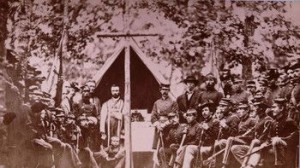 Today’s South Carolina Confederate Baptist newspaper publishes the obituaries of two ministers whose lives were taken earlier in the war. Both were pastors of churches in the state’s Reedy River Association.
Today’s South Carolina Confederate Baptist newspaper publishes the obituaries of two ministers whose lives were taken earlier in the war. Both were pastors of churches in the state’s Reedy River Association.
REV. R. B. HALK.
A member of New Harmony Church, licensed in 1859. He was sent to school two years under the guardianship of the Association, who were anxious, upon the favorable report of his teacher, that he should continue. But saying, “that he could not be satisfied without doing something in this country’s cause,” he volunteered in the 14th Regiment, and fell at the second battle of Manassas, August 29, 1862, at the age of twenty-four years.
REV. W. M. J. BOYD.
This highly esteemed brother volunteered in the 3d Regiment, in July, 1862, and was stricken down at the battle of Fredericksburg, December 13, 1862. He was early singled out as a boy of promise, and as he grew in years fully equalled the expectations he had thus excited. In 1847 he became the subject of renewing grace, and was received into the New Prospect Church, and in 1859 was licensed to preach, and was at once felt to be an able minister of the Gospel. After he entered the service of his country, his regiment being destitute of a chaplain, he labored earnestly and faithfully in promoting the spiritual welfare of his comrades in arms.
Meanwhile, today’s North Carolina Baptist Biblical Recorder publishes dozens of news items regarding revivals in army camps and home front churches. God is especially blessing this year’s revival season both in the army and on the home front, evidenced in hundreds if not thousands of conversions in the past few weeks.
At the same time, another piece in the Recorder offers a somber warning about infidel scholars in England who are questioning the Mosaic authorship of the Old Testament book of Deuteronomy:
We have previously noticed the publication of a work on the Pentateuch, by the Bishop of Colenso, designed to discredit that portion of Scriptures. The third part of his infidel work has just appeared in London. It treats the origin and authorship of the book of Deuteronomy, and attempts to show that “there are plain signs that the book was written by the same author or authors by whom the main portion of the Pentateuch was composed,” and that Jeremiah was possibly the writer of Deuteronomy. In the preface Bishop Colenso essays to answer the criticism written by the Bishop of Oxford upon the first and second parts, which have, it is said, called out no less than seventy-five controversial volumes on the subject in England, besides an enormous outpouring of less solid criticism in periodicals of every size and denomination.
In short, a martyr’s death in service of the Confederate Army, as well as revival conversions, are all and good, but a proper view of scripture is a must. In the post-war Baptist world of the South, the Confederate cause is esteemed by many as holy, Confederate army revivals are fondly remembered, and the battle for a literal Bible (African slavery being the subject before and during the war) continues unabated.
Sources: Confederate Baptist, September 2, 1863 (link); “Infidelity,” Biblical Recorder, September 2, 1863 (link); George P. Landow, “Bishop Colenso and the Literal Truth of the Bible” (link)


